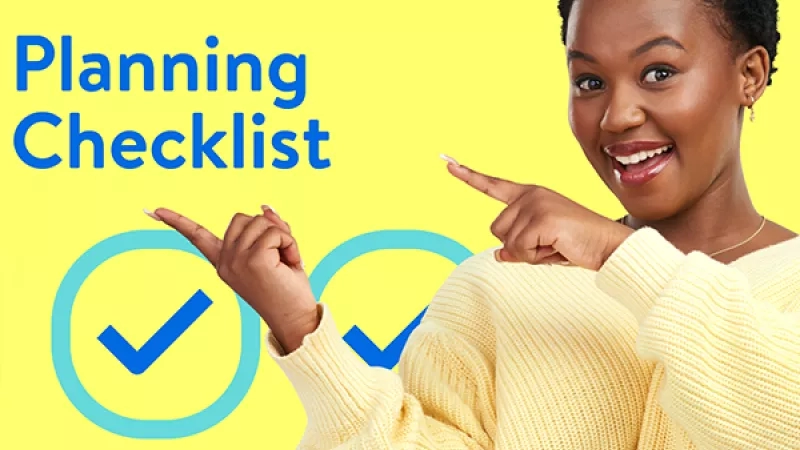With a streamlined event proposal template, you can communicate your vision, win over decision-makers, and kickstart the planning process by aligning goals and logistics. A great template will make event planning much less stressful and more organized.
In this post, we'll explain:
Contents:
Read on to get started.
What is an Event Proposal Template?
An event proposal is a detailed plan that outlines your event concept, objectives, budget, venue, schedule, staffing needs, and more. It's your pitch to potential clients or stakeholders about why your event idea should be selected and funded.
Why Is An Event Proposal Template Important?
There are several key reasons you should use an event proposal template:
- It keeps you organized. Planning an event involves juggling many moving parts. A template ensures you cover all your bases and don't leave out essential details.
- It sells your event. A professional-looking proposal shows you've thoroughly thought through all aspects of your event. This builds confidence in your abilities.
- It allows for easy editing. A template gives you a starting structure, so you don't have to start from scratch every time. You can make minor tweaks for each new proposal.
- It saves time. Rather than reinventing the wheel, a template provides an excellent framework to work from and speeds up the planning process.
- It standardizes proposals. Using a template ensures all your proposals have a consistent look, feel, and format for a more professional impression.
Key Components of Event Proposal Templates
The events Industry is expected to reach $1552.9 billion by 2028. With such staggering growth, it's no surprise that there are countless generic event proposal samples or examples for planners and agencies.
But imagine this: Amidst a sea of emails in your ideal client's inbox, your event proposal looks eerily similar to the dozen others they've received. It's not quite the impression you're aiming for, is it?
To stand out, include the following elements in your event proposal template:
- Cover page and table of contents
- Client details and branding
- Event specifics like name, date, and description
- Insights into the event's experience and objectives
- Introduction to your company and branding
- Profiles of your team members
- Detailed scope of the event's work
- Breakdown of costs, budgeting, and scheduling
- Necessary contractual elements and signatures
Here's a nugget of wisdom: To truly stand out, craft a unique event proposal template. Remember, a staggering 99% of marketers vouch for the effectiveness of personalization in building client rapport. So, in event planning proposals, being distinct isn't just nice—it's necessary.
Steps to Crafting Event Proposal Templates That Impress Every Time
Here's a structured approach to ensure your proposal is unique and aligns seamlessly with your client's vision:
1. Initiate a Discovery Session
Before delving into your proposal, you must grasp your potential client's event vision. Arrange a preliminary meeting to map out their aspirations.
Points to explore:
- Event Title
- Event nature (e.g., conference, gala)
- Event's purpose
- Anticipated guest count
- Preferred date, time, and venue
- Envisioned theme and ambiance
While your client may still be finalizing their thoughts, your expertise can guide them. Showcase your portfolio, suggest mood boards, and pitch creative concepts. Always ensure your interactions echo professionalism, leaving a lasting positive imprint.
2. Highlight Your Expertise
Kickstart your proposal by spotlighting your credentials and your team's prowess.
This segment should detail:
- A concise bio outlining your journey
- Your event management expertise
- Your professional scope
- Relevant credentials or licenses
- Noteworthy references and affiliations
- Stellar achievements underscoring your aptitude
Remember, your potential client might be comparing proposals. Emphasize unique skills that resonate with this particular event's requirements.
3. Craft a Captivating Event Synopsis
Post introductions, dive into the essence of your proposal, the event blueprint.
This should have:
- The event's mission
- Insights from initial client discussions
- A projected timeline
- Potential partners, such as venues or caterers
- The envisioned ambiance and decor
While logistical details matter, this section should ignite excitement and confidence in your abilities. If writing isn't your forte, consider seeking professional assistance. Enriching this section with visuals, like mood boards, further elucidates your concept.
4. Detail Your Offered Services
Provide a comprehensive breakdown of your services, covering everything from decor to logistical partners. For intimate events, a bulleted list or table suffices. More significant occasions might require categorized listings to ensure clarity.
5. Flaunt Your Portfolio
Should any reservations linger, this segment aims to dispel them. Showcase a curated selection of past events, especially those mirroring the current project. Visuals paired with glowing testimonials emphasize your expertise.
6. Present a Detailed Budget Outline
Clearly, potential clients will scrutinize the financial aspect. Furnish an itemized cost breakdown, underscoring the value proposition of each expenditure. Be meticulous, ensuring no hidden or overlooked costs. Highlight potential savings, like early-bird discounts, as added value.
7. State Your Operational Policies
Towards the conclusion, clarify any operational terms to ensure transparency.
Potential inclusions:
- Guaranteed minimum attendees
- The validity period for the proposal
- Cancellation stipulations
- Equipment damage or rental clauses
- Payment timelines
Conclude your proposal with gratitude for their consideration. Always leave them with clear channels for clarifications or to commence collaboration.
Example of An Event Proposal Template
Here is an example of an event proposal template that can help your clients’ envision an event that's nothing short of spectacular.
[Your Company Logo]
Event Proposal For: [Client's Name / Company Name]
Prepared By: [Your Name and Position]
Date: [Proposal Date]
1. Executive Summary
Provide a brief overview of the event, its purpose, and how it aligns with the client's goals or objectives.
2. Introduction
About Us: Short description of your company, experience, and why you are the best fit for planning this event.
Our Understanding of Your Event: Your interpretation of the client's requirements and how you envision the outcome.
3. Event Details
Event Name: [Proposed name or client-given name]
Event Type: [e.g., Conference, Seminar, Workshop, Gala, Wedding, etc.]
Event Date and Time: [Proposed or client-given dates]
Venue: [Proposed venue with address and features]
Number of Guests: [Expected count]
4. Event Vision
Theme and Aesthetics: Describe the proposed theme, color palette, ambiance, and special features.
Objective and Goals: Clearly state what the event aims to achieve.
5. Proposed Services
- Venue Booking and Logistics: Description of the chosen venue and logistical details.
- Decoration and Setup: What will the decor be like? Themes, color schemes, etc.
- Catering and Menu Selection: Discuss proposed caterers, menu options, etc.
- Entertainment and Activities: Detail on planned entertainment or activities.
- Technology and AV Setup: Any technological solutions, like event management software, projectors, microphones, virtual solutions, event marketing tools, etc.
- Guest Management and Registration: How will guests be managed, RSVPs, seating arrangements, etc.?
- Security and Safety Measures: Detail on how guests will be kept safe.
- Post-Event Services: e.g., cleanup, feedback collection, etc.
6. Event Technology Integration
Highlight the modern tools and platforms you'll use to enhance the event experience.
7. Portfolio
Insert or link to pictures, videos, and testimonials from your past events that align closely with the client's needs.
8. Budget Overview
- Venue Costs: $[Amount]
- Decor and Setup: $[Amount]
- Catering: $[Amount]
- Entertainment: $[Amount]
- Technology: $[Amount]
- Miscellaneous: $[Amount]
Total Estimated Budget: $[Total Amount]
Include a note about how you can adjust costs based on client preferences.
9. Event Policies
- Minimum Headcount Guarantee:
- Booking Time Limit:
- Cancellation Policy:
- Damage or Rental Policies:
- Payment Due Dates:
10. Conclusion and Call to Action
Wrap up your proposal with gratitude for considering your services. Encourage them to reach out with questions or to finalize the agreement.
Contact Information
- Company Name: [Your Company Name]
- Address: [Your Company Address]
- Phone: [Your Phone Number]
- Email: [Your Email Address]
- Website: [Your Website]
Pro Tip: Encourage your clients to provide feedback on the proposal. Flexibility and openness to changes are essential, ensuring you align with their vision and requirements.
Best Practices For Crafting Event Proposal Templates
1. Engage with Clarity
Avoid jargon or overly technical language. You're speaking to potential clients, not just other event planners. The more straightforward and clear your proposal is, the easier it is for the client to understand the value you bring. Simplicity doesn't mean compromising on detail; it means presenting information in a digestible manner.
2. Introduce Testimonials and Case Studies
Your past successes are the best indicator of your future performance. Including client testimonials or short case studies of previous events you've managed can offer credibility. Showcasing real-world examples of challenges you've overcome and achieved results can further build trust.
3. Provide A Clear Timeline
Mapping out a timeline shows that you've given thought to every phase of the event planning process. This provides a clear picture to the client about the event's progression and demonstrates your organizational prowess. Break it down week by week or month by month, highlighting major milestones and decision points.
4. Tailor Each Proposal
Every event is unique. While you may have a standard proposal format, ensure each proposal is tailored to the specific needs and expectations of the client. Show them you've listened and crafted a solution for them, not a one-size-fits-all proposal.
5. Provide Multiple Contact Points
Make it easy for your client to reach out with questions or clarifications. Whether they prefer phone, email, or another communication method, ensure you're available. This not only provides convenience but also showcases your commitment to being accessible.
6. Conclude with Appreciation and Enthusiasm
End your proposal on a positive and forward-looking note. Express gratitude for the opportunity to submit a proposal and the potential to work together. Display enthusiasm about bringing their event vision to life, and reiterate that your primary goal is to exceed their expectations.
Remember, your proposal isn't just a document. It's a promise and an introduction to the memorable event experience you aim to create.
Bonus Tip: Use Event Technology
Incorporating cutting-edge event technology can elevate the entire experience and offer a plethora of benefits:
Efficiency and Organization: Event management software helps streamline the planning process, from sending out digital invites to tracking RSVPs in real time. It reduces manual work and ensures nothing slips through the cracks.
Engagement Boost: Integrate interactive features like live polls or Q&A sessions into events to drive audience engagement. Augmented and virtual reality can transport attendees to different worlds or offer virtual site tours, creating memorable experiences.
Data-Driven Decisions: Event technology can provide valuable insights. From understanding attendee demographics to analyzing engagement metrics, this data can be used to tailor future events and ensure they resonate even more with the target audience.
Hybrid Event Solutions: Given the increasing trend of virtual and hybrid events, platforms that manage in-person and digital attendees are invaluable. They allow for broader reach and participation, breaking down geographical barriers.
Real-time Communication: The right technology can facilitate push notifications, real-time updates, and instant feedback loops. This ensures that attendees are always in the loop and can be notified of any changes or important announcements immediately.
Sustainability: Digital brochures, e-tickets, and online resources reduce the need for physical materials, aligning with more eco-friendly practices.
Personalized Experiences: With technology, events can offer tailored content or customized schedules based on attendee preferences, ensuring a more relevant and meaningful experience for each individual.
Conclusion
Incorporating these tools and innovations into your proposal will not only demonstrate your competency and foresight but will also signal to potential clients that you're on the cutting edge of event planning. They'll feel assured that by choosing your team, they're opting for a modern, efficient, and engaging event that will be memorable for everyone.
In the rapidly growing events industry, staying ahead of the curveand showcasing adaptability through integrating technology is essential. It's not just about the now; it's about paving the way for future events. Join us, and together, let's revolutionize the event experience.










